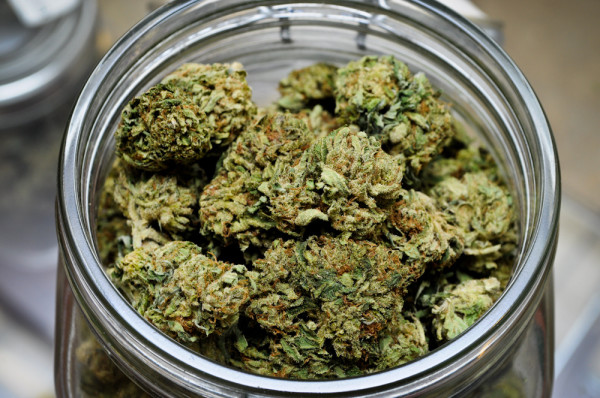

An overwhelming majority of U.S. military veterans and veteran caregivers support the legalization of marijuana for medical purposes, according to a new national poll by Five Corner Strategies conducted on behalf of the American Legion — and veterans aren’t going to stop until the Department of Veterans Affairs starts taking medical marijuana research seriously.
The poll found that while 82% of respondents supported the legalization of medical cannabis, a whopping 92% supported expanded research into the medical benefits of the drug. And that attitude cuts across political boundaries: 88% of respondents who self-identified as “conservative” and 90% of self-identified “liberals” supported a federal legalization effort.
Medical cannabis is currently only legal in 29 states and the District of Columbia; yet, it is unlawful for VA doctors to prescribe it since marijuana remains a Schedule 1 substance — forcing vets to use medical cannabis at their own risk or not at all. Further, shortfalls in funding, restrictive eligibility criteria for a recently approved federal study specific to vets, and little support from the VA has prevented any policies from moving forward in Washington, despite a growing acceptance of marijuana to mitigate pain and mental-health issues.
Related: Lawmakers Are Urging The VA To Take Medical Marijuana For Veterans Seriously »
According to the American Legion’s new poll, one in five veterans surveyed consume marijuana “to alleviate a medical or physical condition.” Ironically, the majority of those using medicinal pot are over the age of 60, despite support for the practice declining among older respondents, where 100% of 18-30-year-old respondents favored federally legalized medical marijuana, only 79% of sexagenarians agreed.
Following the release of the poll, conducted by national PulsePoint IVR on 802 self-identified veterans (513 respondents) and veteran caregivers (289) between Oct. 8 and Oct. 10, 2017, on Capitol Hill on Nov. 2, the American Legion, in conjunction with members of the House Committee on Veterans Affairs, called upon Secretary of Veterans Affairs David Shulkin to push for new research despite an increasingly obstinate approach to legalization by Attorney General Jeff Sessions.
“In order to keep veterans safe, we need to listen then,” Rep. Mark Takano, a Democrat from California and vice ranking member on the House Committee on Veterans Affairs, told the assembled crowd. “When a majority of veterans say medical cannabis has the potential to provide relief, we need to listen to them … If the VA’s research confirms that medical cannabis can be effective, it can have a transformative effect of veterans care while preventing veterans from lipping into the trap of opioid addiction.”

Different varieties of marijuana flowers are displayed at medical marijuana dispensary Kaya Shack in Portland, Oregon, June 26, 2015.Photo via Associated Press
The poll is the culmination of a growing push to change the federal government’s approach to veterans and medical marijuana. In a Oct. 26 letter to Shulkin, lawmakers on the House Committee on Veterans Affairs called on the VA to initiate renewed research into the medical benefits of legal cannabis, citing both a rising chorus of veterans advocacy organizations like the American Legion and the opioid epidemic that the Trump administration declared a national health emergency the same day.
While the VA has done little to move the needle on medical marijuana research, Shulkin has personally said he’s open to exploring alternative therapies, including medicinal weed, if they benefit veterans and their care.
“We are acutely aware of the work that’s going on around the country, particularly in states that have legalized medical marijuana,” Shulkin told Task & Purpose in a June 12 interview. “And we are observing very closely work that’s being done that may be helping veterans, and we are open to any ideas and therapies that may be effective.”
National attitudes toward marijuana legalization have come a long way in recent years: According to an Oct. 25 Gallup poll conducted around the same time as the American Legion survey, a majority of registered Republicans are in support of marijuana legalization for the first time in a half-century. But even with public support for recreational marijuana legalization at an all-time high, only 64% are in favor of ending the federal prohibition on the substance — well below the levels of support detailed among veterans and military families in recent surveys.
While many veterans and doctors are already working to circumvent the VA’s existing medical marijuana policies, as Task & Purpose reported in October, it’s those changing attitudes among military and VA officials that will shape the course of medical marijuana research.
Related: How Vets And Their Doctors Are Getting Around The VA’s Medical Marijuana Policy »
“As we researched, we came across veterans who said that the only reason they were alive today and didn’t commit suicide was because they found medical cannabis,” Lou Celli, the American Legion’s national director of veterans affairs and rehabilitation, said on Nov. 2. “But you and I know we can’t change policy based on anecdotes. We need facts in order to have a meaningful discussion. And in order to get evidence and facts, we must do clinical research.”
WATCH NEXT: